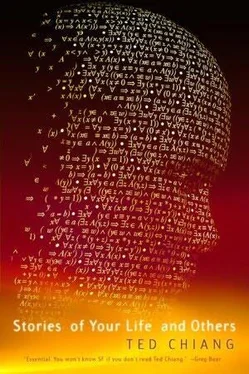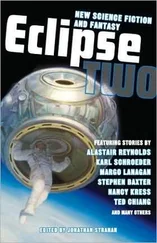Ted Chiang - Understand
Здесь есть возможность читать онлайн «Ted Chiang - Understand» весь текст электронной книги совершенно бесплатно (целиком полную версию без сокращений). В некоторых случаях можно слушать аудио, скачать через торрент в формате fb2 и присутствует краткое содержание. Жанр: Фантастика и фэнтези, на английском языке. Описание произведения, (предисловие) а так же отзывы посетителей доступны на портале библиотеки ЛибКат.
- Название:Understand
- Автор:
- Жанр:
- Год:неизвестен
- ISBN:нет данных
- Рейтинг книги:5 / 5. Голосов: 1
-
Избранное:Добавить в избранное
- Отзывы:
-
Ваша оценка:
- 100
- 1
- 2
- 3
- 4
- 5
Understand: краткое содержание, описание и аннотация
Предлагаем к чтению аннотацию, описание, краткое содержание или предисловие (зависит от того, что написал сам автор книги «Understand»). Если вы не нашли необходимую информацию о книге — напишите в комментариях, мы постараемся отыскать её.
Understand — читать онлайн бесплатно полную книгу (весь текст) целиком
Ниже представлен текст книги, разбитый по страницам. Система сохранения места последней прочитанной страницы, позволяет с удобством читать онлайн бесплатно книгу «Understand», без необходимости каждый раз заново искать на чём Вы остановились. Поставьте закладку, и сможете в любой момент перейти на страницу, на которой закончили чтение.
Интервал:
Закладка:
We continue. We are like two bards, each cueing the other to extemporize another stanza, jointly composing an epic poem of knowledge. Within moments we accelerate, talking over each other's words but hearing every nuance, until we are absorbing, concluding, and responding, continuously, simultaneously, synergistically.
——————————————————————————
Many minutes pass. I learn much from him, and he from me. It's exhilarating, to be suddenly awash in ideas whose implications would take me days to consider fully. But we're also gathering strategic information: I infer the extent of his unspoken knowledge, compare it with my own, and simulate his corresponding inferences. For there is always the awareness that this must come to an end; the formulation of our exchanges renders ideological differences luminously clear.
Reynolds hasn't witnessed the beauty that I have; he's stood before lovely insights, oblivious to them. The sole gestalt that inspires him is the one I ignored: that of the planetary society, of the biosphere. I am a lover of beauty, he of humanity. Each feels that the other has ignored great opportunities.
He has an unmentioned plan for establishing a global network of influence, to create world prosperity. To execute it, he'll employ a number of people, some of whom he'll give simple heightened intelligence, some meta-self awareness; a few of them will pose threats to him. >
>
I can measure the distance between our respective moral stances precisely, see the stress between their incompatible radiating lines. What motivates him is not simply compassion or altruism, but something that entails both those things. On the other hand, I concentrate only on understanding the sublime. >
>
He considers intelligence to be a means, while I view it as an end in itself. Greater intelligence would be of little use to him. At his present level, he can find the best possible solution to any problem within the realm of human experience, and many beyond. All he'd require is sufficient time to implement his solution.
There's no point in further discussion. By mutual assent, we begin.
It's meaningless to speak of an element of surprise when we time our attacks; our awareness can't become more acute with forewarning. It's not affording a courtesy to each other when we agree to begin our battle, it's actualizing the inevitable.
In the models of each other that we've constructed from our inferences, there are gaps, lacunae: the internal psychological developments and discoveries that each has made. No echoes have radiated from those spaces, no strands have tied them to the world web, until now.
I begin.
I concentrate on initiating two reinforcing loops in him. One is very simple: it increases blood pressure rapidly and enormously. If it were to continue unchecked for over a second, this loop would raise his blood pressure to stroke levels — perhaps 300 over 200 — and burst capillaries in his brain.
Reynolds detects it immediately. Though it's clear from our conversation that he never investigated the inducement of biofeedback loops in others, he recognizes what is happening. Once he does, he reduces his heart rate and dilates the blood vessels throughout his body.
But it is the other, subtler reinforcing loop that is my real attack. This is a weapon I've been developing ever since my search for Reynolds began. This loop causes his neurons to dramatically overproduce neurotransmitter antagonists, preventing impulses from crossing his synapses, shutting down brain activity. I've been radiating this loop at a much higher intensity than the other.
As Reynolds is parrying the ostensible attack, he experiences a slight weakening of his concentration, masked by the effects of the heightened blood pressure. A second later, his body begins to amplify the effect on its own. Reynolds is shocked to feel his thoughts blurring. He searches for the precise mechanism: he'll identify it soon, but he won't be able to scrutinize it for long.
Once his brain function has been reduced to the level of a normal, I should be able to manipulate his mind easily. Hypnotic techniques can make him regurgitate most of the information his enhanced mind possesses.
I inspect his somatic expressions, watching them betray his diminishing intelligence. The regression is unmistakeable.
And then it stops.
Reynolds is in equilibrium. I'm stunned. He was able to break the reinforcing loop. He has stopped the most sophisticated offensive I could mount.
Next, he reverses the damage already done. Even starting with reduced capabilities, he can correct the balance of neurotransmitters. Within seconds, Reynolds is fully restored.
I too was transparent to him. During our conversation he deduced that I had investigated reinforcing loops, and as we communicated, he derived a general preventative without my detecting it. Then he observed the specifics of my particular attack while it was working, and learned how to reverse its effects. I am astonished at his discernment, his speed, his stealth.
He acknowledges my skill. > abruptly he projects a different somatic signature, one that I recognize. He used it when he walked behind me at a grocery store, three days ago. The aisle was crowded; around me were an old woman, wheezing behind her air filter, and a thin teenager on an acid trip, wearing a liquid crystal shirt of shifting psychedelic patterns. Reynolds slipped behind me, his mind on the porn mag stands. His surveillance didn't inform him of my reinforcing loops, but it did permit a more detailed picture of my mind.
A possibility I anticipated. I reformulate my psyche, incorporating random elements for unpredictability. The equations of my mind now bear little resemblance to those of my normal consciousness, undermining any assumptions Reynolds may have made, and rendering ineffectual any psyche-specific weapons of his.
I project the equivalent of a smile.
Reynolds smiles back. > Suddenly he projects only silence. He is about to speak, but I can't predict what. Then it comes, as a whisper: “— self-destruct commands, Greco?”
As he says it, a lacuna in my reconstruction of him fills and overflows, the implications coloring all that I know about him. He means the Word: the sentence that, when uttered, would destroy the mind of the listener. Reynolds is claiming that the myth is true, that every mind has such a trigger built in; that for every person, there is a sentence that can reduce him to an idiot, a lunatic, a catatonic. And he is claiming he knows the one for me.
I immediately tune out all sensory input, directing it to an insulated buffer of short-term memory. Then I conceive a simulator of my own consciousness to receive the input and absorb it at reduced speed. As a metaprogrammer I will monitor the equations of the simulation indirectly. Only after the sensory information has been confirmed as safe will I actually receive it. If the simulator is destroyed, my consciousness should be isolated, and I'll retrace the individual steps leading to the crash and derive guidelines for reprogramming my psyche.
I get everything in place by the time Reynolds has finished saying my name; his next sentence could be the destruct command. I'm now receiving my sensory input with a one hundred and twenty millisecond time lag. I reexamine my analysis of the human mind, explicitly searching for evidence to verify his assertion.
Meanwhile I give my response lightly, casually. >
>
My search produces something. I curse myself: there's a very subtle back door to a psyche's design, which I lacked the necessary mindset to notice. Whereas my weapon was one born of introspection, his is something only a manipulator could originate.
Reynolds knows that I've built my defenses; is his trigger command designed to circumvent them? I continue deriving the nature of trigger command's actions.
Читать дальшеИнтервал:
Закладка:
Похожие книги на «Understand»
Представляем Вашему вниманию похожие книги на «Understand» списком для выбора. Мы отобрали схожую по названию и смыслу литературу в надежде предоставить читателям больше вариантов отыскать новые, интересные, ещё непрочитанные произведения.
Обсуждение, отзывы о книге «Understand» и просто собственные мнения читателей. Оставьте ваши комментарии, напишите, что Вы думаете о произведении, его смысле или главных героях. Укажите что конкретно понравилось, а что нет, и почему Вы так считаете.











